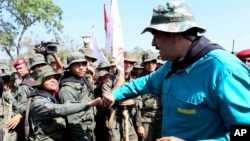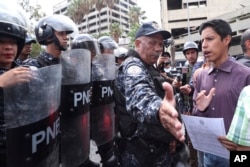Seven Venezuelan military officers were killed Saturday when their helicopter crashed while heading to a state where President Nicolas Maduro appeared alongside troops, days after the opposition called in vain for a military uprising.
The Cougar helicopter hurtled into a mountain outside Caracas in the early hours of an overcast day in the capital. An investigation was underway.
The armed forces in a statement said the chopper was heading to San Carlos in Cojedes state. That’s near a military academy where Maduro appeared early Saturday to oversee training exercises following a week of intrigue that saw a small group of security forces turn against him in the failed attempt by opposition leader Juan Guaido to overthrow the government.
On board the helicopter were two lieutenant colonels as well as five lower-ranking officers. The statement didn’t say if the chopper was part of the presidential delegation.
Maduro and military
The critical role of the Venezuelan military in the country’s crisis was on display as Maduro tried to portray strength by joining troops at the military academy, while Guaido attempted to woo the armed forces to his side by urging supporters to the streets.
National television showed Maduro wearing a camouflage hat as he shook hands and exchanged fist bumps with security forces during a visit to a military base before watching troops engage in a shooting exercise.
“Loyal forever,” Maduro bellowed to a crowd of cadets in green uniforms.
Guaido faithful take to streets
Guaido, meanwhile, told backers to go to military garrisons to persuade forces to turn against Maduro, whose years in office have been marked by escalating hardship for most people in a country that was once one of the wealthiest in Latin America.
As demonstrators linked arms and moved toward police, protest leader Maria Suarez urged calm.
“Please, a lot of discipline,” she said.
Some broke the line and went forward to hand over printed documents, saying the military’s role in helping Venezuela emerge from an “unsustainable” situation is vital.
“They think it’s a joke. They don’t take us seriously. They’re not listening,” said demonstrator Andrea Palma after police burned the paper with a lighter.
Divisions among the protesters were evident as some young men from poor neighborhoods scoffed at a speaker who insisted that the gathering must be peaceful.
“It’s the frustration talking,” said demonstrator Mariajose Molina.
One protester looked on as the printed proclamation was burned. He then wished the policeman a nice day.
“See you later,” replied the officer before turning away.





